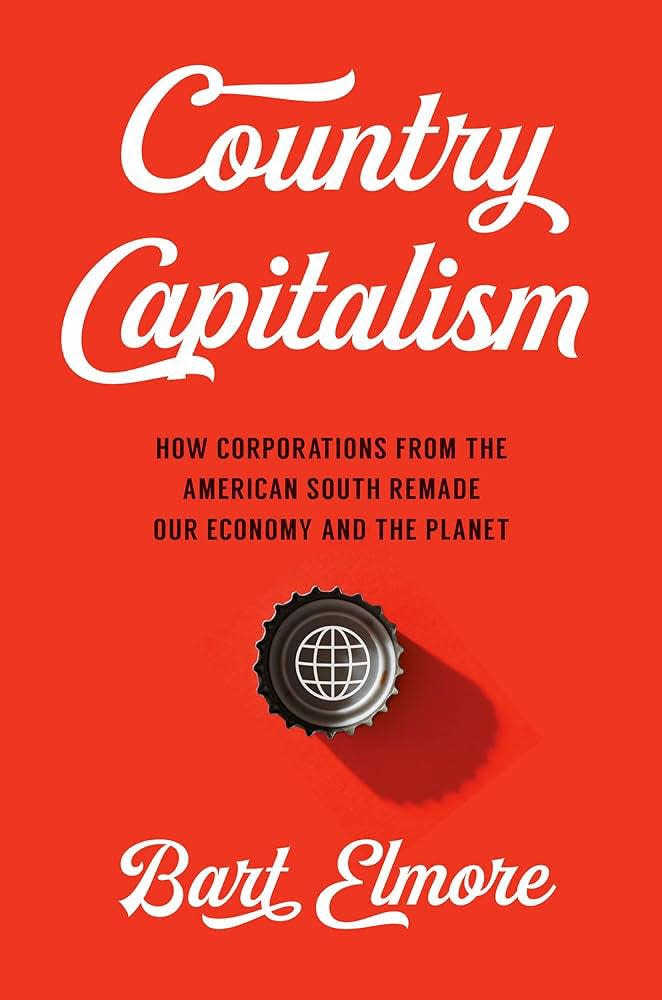New book on 'Country Capitalism' argues that Southern businesses changed the world economy

For a long time before controversial hit song "Rich Men North of Richmond," folks have been arguing that the South is treated like a colony by Eastern elitists, multinational corporations and others.
Historian Bart Elmore argues it's the other way around.
In "Country Capitalism: How Corporations from the American South Remade Our Economy and the Planet," Elmore identifies five corporations, all based south of the Mason-Dixon Line, that dominate their fields and whose innovations changed how business is done in America.
Coca-Cola created an international soft drink market through its network of bottlers. Atlanta-based Delta Airlines innovated the hub-and-spoke system of airline routes. Memphis-based FedEx did much the same thing for air transport. Walmart, from Bentonville, Arkansas, became the dominant big-box retailer. And Charlotte's Bank of America, which some old-timers might remember as NCNB or NationsBank, became the largest retail banker.

Elmore, an Atlanta native who earned his graduate degree at the University of Virginia, further argues that these five achieved success because they launched in the South.
Specifically, they solved problems of delivering to small towns and tiny farm communities scattered over a wide area. As Elmore put it, each is important mainly as a conduit rather than as a producer.
Coke spread through its network of local bottlers. Unlike founder Asa Candler, CEO Robert Woodruff recognized there was more money to be made shipping bottles to country stores and groceries than in selling syrup to soda fountains. As a former trucking exec, Woodruff had the background to organize Coke's distribution system.
Delta (which began as a crop-dusting firm in Louisiana) and FedEx profited by serving small communities that the larger airlines didn't. Sam Walton's WalMart started out in communities of 10,000 or less, enabling the company to draw customers from a wider radius.
"Country Capitalism" is not a tale of unalloyed triumph. Elmore, who teaches at Ohio State University, specializes in environmental history. He argues that the tactics employed by these big firms often damage the environment and are unsustainable in the long run.
Coke didn't just build a fleet of gas-guzzling trucks. They kept all those bottles and cans ice-cold for immediate demand with heavy refrigeration, using vast quantities of chlorofluorocarbons and hydrofluorocarbons, greenhouse gases that contribute heavily to global warming. (CFCs, in particular, depleted the Earth's ozone.)
Walton and his wife were famous canoeists and quail hunters who loved the outdoors and small-town life. Yet we sometimes kill the things we love. Walmarts sucked the life out of many Main Street mom-and-pop competitors, although some studies suggest the impact isn't as drastic as once thought. Moreover, its big stores required giant asphalt parking lots and bigger roads to carry its supply trucks, leaving farmland and meadows bulldozed.
Meanwhile, critics charge that Bank of America's policies have promoted fossil fuel extraction and consumption, delaying a transition to alternative energy sources.
All five corporations have pledged to take steps to combat climate change, but in Elmore's estimation, the results have been mixed. His prescription is tighter environmental regulation by state and federal governments. But he concedes that will be a tough sell in a region of red states where Getting the Government Off Our Backs is an article of faith.
Book review
'COUNTRY CAPITALISM: How Corporations from the American South Remade Our Economy and the Planet'
By Bart Elmore
Chapel Hill: University of North Carolina Press, $28
This article originally appeared on Wilmington StarNews: 'Country Capitalism' by Bart Elmore, Southern business, world economy

